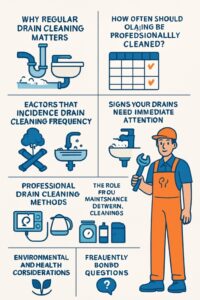Home Maintenance
How Often Should You Have Your Drains Professionally Cleaned?
Table of Contents:
- Why Regular Drain Cleaning Matters
- How Often Should Drains Be Professionally Cleaned?
- Factors That Influence Drain Cleaning Frequency
- Signs Your Drains Need Immediate Attention
- Professional Drain Cleaning Methods
- The Role of DIY Maintenance Between Cleanings
- Environmental and Health Considerations
- Frequently Asked Questions
Why Regular Drain Cleaning Matters
Clogged drains are a common nuisance, often leading to slow water flow, foul smells, and even damage to your home’s plumbing and surfaces. Over time, soap residue, grease, hair, mineral deposits, and foreign objects can accumulate, creating stubborn blockages that impact water quality and sanitation. Proactive, routine cleaning removes these buildups, keeping everything flowing smoothly and dramatically reducing the risk of future emergencies.
For those seeking peace of mind and longevity in their plumbing system, scheduling drain cleaning Tucson AZ services ensures that even hidden problems are detected early before they develop into costly repairs or significant sanitation concerns. Professional drain cleaning also helps maintain optimal water pressure and prevents bacteria buildup. By investing in regular maintenance, homeowners can extend the life of their plumbing system and avoid disruptive clogs or backups.
How Often Should Drains Be Professionally Cleaned?
Industry experts generally recommend professional cleaning for most households at least once every one to two years. However, annual cleanings can prevent frequent clogs and future pipe damage in homes with high traffic, frequent cooking, or older plumbing. Households with large families, tenants, or frequent guests tend to benefit from yearly maintenance, while smaller households with low usage might safely schedule cleanings every two years. Preventive cleaning helps avoid disruptive issues that always seem to happen at inconvenient times.
Factors That Influence Drain Cleaning Frequency
Several considerations come into play when deciding on a schedule. Homes with old or corroded pipes may be more prone to blockages, while tree roots nearby can infiltrate outdoor drain lines. Households with heavy dishwashers, washing machines, or bathroom traffic will see a quicker accumulation of debris. In addition, properties with histories of past blockages or slow drains should err on the side of more frequent maintenance.
Signs Your Drains Need Immediate Attention
Beyond planned maintenance, be watchful for early warning signs. Persistent slow drainage, water backing up in sinks or tubs, bubbling or gurgling sounds, or musty odors indicate a blockage is forming. If you notice multiple drains acting up simultaneously, it may signal a main line problem requiring immediate professional intervention. Ignoring these signs can escalate into a full-blown backup or even structural damage to your property.
Professional Drain Cleaning Methods
Modern drain care goes beyond plungers and chemical cleaners. Today’s professionals use video inspections to visually identify blockages and cracks deep in your plumbing, pinpointing the cause precisely. Hydro jetting, which is highlighted by the EPA’s recommendations on water-efficient products, clears even the toughest buildup, scouring pipe walls with highly pressurized water and restoring full flow. These state-of-the-art tools solve current issues and help prevent future ones, preserving your system’s performance and value.
The Role of DIY Maintenance Between Cleanings
Between professional appointments, homeowners can minimize risk with simple practices: regularly use drain covers to catch hair and debris, flush drains with hot water weekly, and avoid pouring grease down the kitchen sink. Non-chemical remedies, like baking soda and vinegar, offer a safe option for breaking down mild buildup. However, if these methods don’t resolve problems, never force clogs further down—leave persistent issues for expert attention.
Environmental and Health Considerations
Choosing drain care strategies and products that are safe for your pipes and the environment is important. Avoid harsh chemicals that can degrade plumbing and contaminate groundwater. Mechanical cleaning, enzyme-based solutions, and high-pressure water jetting all offer eco-friendly alternatives. These not only reduce health risks but also safeguard local ecosystems.
Frequently Asked Questions
Can frequent professional cleaning damaged pipes?
When performed by qualified technicians, routine cleaning helps protect pipes, not harm them. Newer cleaning methods are gentle but reliable for most modern plumbing systems.
Is DIY maintenance enough?
While DIY efforts can reduce minor buildup, they should complement—not replace—regular professional services, especially in busy or older homes.
What’s the most eco-friendly option?
Mechanical, water-based, and enzyme cleaners are the safest for pipes, property, and the planet.
Scheduling regular professional drain cleaning is a simple decision that pays dividends for your home’s comfort and safety. It ensures clean, reliable plumbing for years to come.















